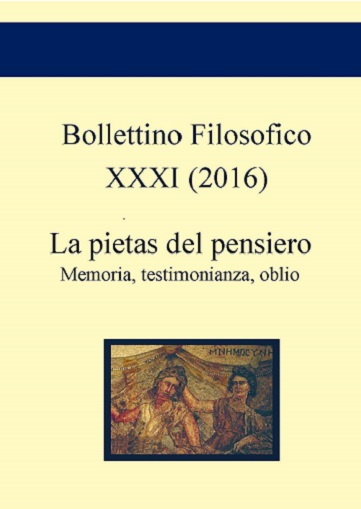La logica trascendentale del tempo. Comunicazione e trascendenza in Wolfgang Cramer e Karl Jaspers
DOI:
https://doi.org/10.6093/1593-7178/4047Parole chiave:
tempo, azione, intuito, coscienza, comunicazione.Abstract
According to Kant, time has a dual nature: on the one hand, it is the form of the external sense and, along with the space, it serves as a detection criterion of physical objects; on the other hand, it is the form of the internal sense, and, thanks to the schematism, it allows the construction of unitary images of phenomena. But the separation between the two conditions of knowledge, sensibility and intellect, does not guarantee the continuity between the physical and the phenomenical world, making enigmatic the unity of consciousness which should accompany all representations. From two different points of view, related to neokantism and to the philosophy of existence respectively, Wolfgang Cramer and Karl Jaspers try to overcome the Kantian difficulty, focusing on transcendentality of the act of consciousness rather than on its contents. It follows a twofold determination of the subject that, as shown by the same Kant, refers to examples from mathematical thinking. While to Cramer the pure intuition is the tangent of time that, through the act of thought, undergoes a process of integration in the experience, to Jaspers every act of consciousness is tied to an individual existence with its particular temporal dimension. In this sense, Cramer’s “integral of consciousness” does not guarantee the communication because it establishes only a difference in the absolute unity of the act, while, according to Jaspers, the real communication is unity in the difference, i.e. elevation of every single existence to the system of others “personal equations”. From this new logic of communication, related to time and transcendence of existence, arises a transcendental and not intellectual logic that Jaspers calls “rational a-logic”.Downloads
##submission.downloads##
Pubblicato
Come citare
Fascicolo
Sezione
Licenza
Bollettino Filosofico pubblica in internet, ad accesso aperto, con licenza:
| CCPL Creative Commons Attribution |
L'autore conserva il copyright sul suo contributo, consentendo tuttavia a chiunque "di riprodurre, distribuire, comunicare al pubblico, esporre in pubblico, rappresentare, eseguire e recitare l'opera", purché siano correttamente citati l'autore e il titolo della rivista. L’autore, al momento della proposta di pubblicazione, è inoltre tenuto a dichiarare che il contenuto e l’organizzazione dell’opera è originale e non compromette in alcun modo i diritti di terzi, né gli obblighi connessi alla salvaguardia di diritti morali ed economici di altri autori o di altri aventi diritto, sia per testi, immagini, foto, tabelle, sia per altre parti di cui il contributo può essere composto. L’autore dichiara altresì di essere a conoscenza delle sanzioni previste dal codice penale e dalle leggi speciali per l’ipotesi di falsità in atti ed uso di atti falsi, e che pertanto Bollettino Filosofico è esente da qualsiasi responsabilità di qualsivoglia natura, civile, amministrativa o penale, e sarà dall'autore tenuta indenne da qualsiasi richiesta o rivendicazione da parte di terzi.

